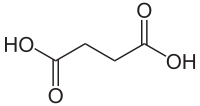
Photo from wikipedia
Abstract Aim: The purpose of this study is to examine the protective effects of Dapsone on inflammation of intestinal tissue through inhibition of NF-kB pathway in acetic acid-induced colitis in… Click to show full abstract
Abstract Aim: The purpose of this study is to examine the protective effects of Dapsone on inflammation of intestinal tissue through inhibition of NF-kB pathway in acetic acid-induced colitis in rats. Methods: Acute colitis was produced by intra-rectal instillation of 2 mL of 4% acetic acid diluted in normal saline. Then, two hours after induction of colitis, DMSO as vehicle, dexamethasone (2 mg/kg) and dapsone (12.5 mg/kg) were given to the animals intraperitoneally (i.p.) and continued for five following days. Evaluation of macroscopic and microscopic damages were done. Myeloid peroxidase enzyme (MPO) activity was measured by a biochemical technique. Moreover, tumor necrosis factor-α (TNF-α) activity was identified by ELISA, and the expression level of pNF-kB protein was evaluated by immunohistochemistry (IHC). Results: Dexamethasone (2 mg/kg) and dapsone (12.5 mg/kg) decreased the macroscopic and microscopic damages compared with acetic acid group (p ˂ .001). Additionally, these agents decreased the activity of MPO (p ˂ .001), TNF-α (p ˂ .001) and the expression level of p-NF-kB (p ˂ .001) in rat colon tissue compared with the acetic acid group. Conclusion: It is proposed that the anti-inflammatory activity of dapsone on acetic acid-induced colitis in rats may involve the inhibition of NF-kB pathway.
Journal Title: Immunopharmacology and Immunotoxicology
Year Published: 2019
Link to full text (if available)
Share on Social Media: Sign Up to like & get
recommendations!